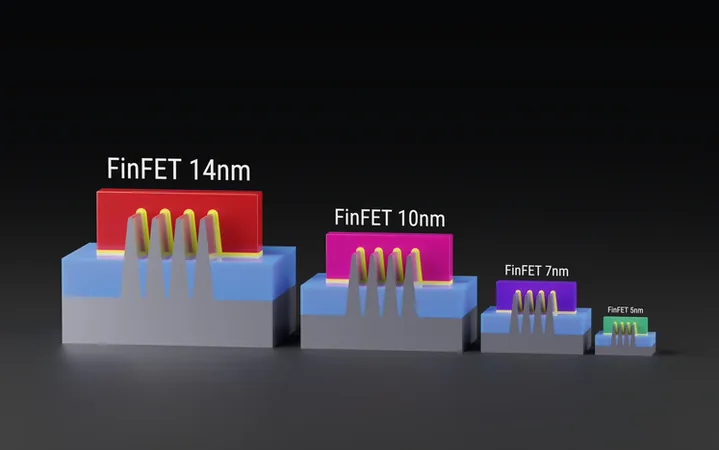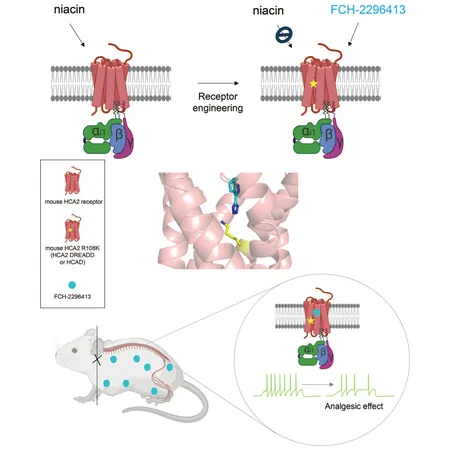
Revolutionary Nanoscale Microchip Could Change the Face of Disease Diagnosis Forever!
2024-12-17
Author: Li
Revolutionary Nanoscale Microchip Could Change the Face of Disease Diagnosis Forever!
In an exciting breakthrough, researchers from NYU Tandon School of Engineering have unveiled a groundbreaking microchip capable of detecting multiple diseases from a single air sample, all at a nanoscale level. This innovation heralds the dawn of portable, at-home diagnostic solutions that could change how we approach health monitoring. Published in the prestigious journal Nanoscale, this advancement in field-effect transistors (FETs) could soon find its way into everyday devices like smartwatches, allowing users to detect minuscule amounts of viruses or bacteria lurking in the air around them.
Dr. Elisa Riedo, a leading researcher and professor of chemical and biomolecular engineering at NYU Tandon, remarked, “This study opens new horizons in the field of biosensing. Microchips, which have revolutionized communication and entertainment technology, are now poised to transform our approach to healthcare, from diagnostics to environmental health monitoring.”
The team of innovators, which includes Dr. Davood Shahrjerdi and Dr. Giuseppe de Peppo, embarked on a mission to leverage the capabilities of FETs to transcend their traditional electronic applications and designed them to identify pathogens through unique digital signals. Dr. Shahrjerdi, who heads the NYU Nanofabrication Cleanroom, explained, “Our innovative technology uses FETs—tiny electronic sensors that can directly detect biological markers and convert these signals into digital form. This technique not only accelerates results but enables simultaneous testing for multiple diseases while ensuring immediate data transmission to healthcare providers.”
One of the pivotal factors in the development of these FETs was the use of advanced materials like graphene and indium oxide. This cutting-edge research allowed the detection of biological signals at remarkably low concentrations, down to femtomolar levels (a staggering one quadrillionth of a mole). Despite this progress, achieving simultaneous detection of various pathogens on a single chip remained a formidable hurdle—until now.
The team employed an innovative method known as thermal scanning probe lithography (tSPL) to craft the microchips. tSPL offers a revolutionary way to pattern FET surfaces with incredible precision—up to 20 nanometers—tailoring them with unique bioreceptors that can identify multiple pathogens on a single chip.
When tested, these remarkable FET-based biosensors demonstrated the capacity to identify as few as three attomolar concentrations of SARS-CoV-2 spike proteins and just 10 live virus particles per milliliter. Astonishingly, these biosensors could also differentiate between various strains, including the notorious influenza A virus. This level of accuracy is a key advancement toward the next generation of diagnostics, potentially usable both in clinical settings and at home.
Backing this remarkable research are strategic partnerships with molecular diagnostics firm Mirimus and the Australian investment company LendLease, which are eager to integrate these pioneering health monitoring technologies into urban infrastructure. Together, they aim to propel these revolutionary diagnostic solutions to market, making health surveillance more accessible.
As advances in semiconductor technology continue to flourish, the scalability of these microchips for widespread use becomes increasingly plausible. The promise of FET-based biosensors is immense—offering the possibility of real-time diagnostics that could unburden healthcare systems and empower individuals to take charge of their health like never before.
Stay tuned, as this groundbreaking technology may soon change how you monitor your health in ways you've never imagined!


 Brasil (PT)
Brasil (PT)
 Canada (EN)
Canada (EN)
 Chile (ES)
Chile (ES)
 España (ES)
España (ES)
 France (FR)
France (FR)
 Hong Kong (EN)
Hong Kong (EN)
 Italia (IT)
Italia (IT)
 日本 (JA)
日本 (JA)
 Magyarország (HU)
Magyarország (HU)
 Norge (NO)
Norge (NO)
 Polska (PL)
Polska (PL)
 Schweiz (DE)
Schweiz (DE)
 Singapore (EN)
Singapore (EN)
 Sverige (SV)
Sverige (SV)
 Suomi (FI)
Suomi (FI)
 Türkiye (TR)
Türkiye (TR)